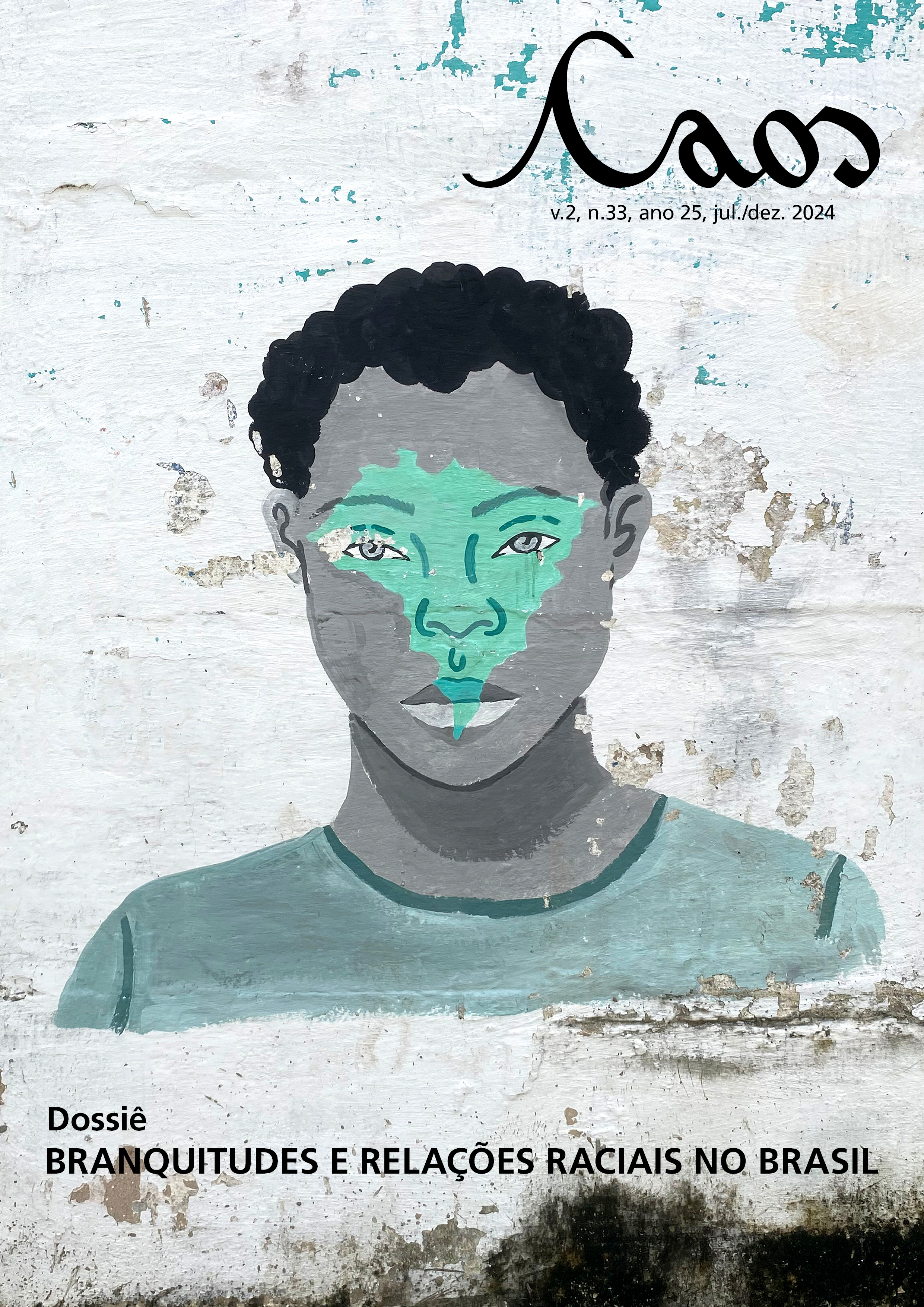THE “SELF-CRITICISM OF WHITENESS” ON INSTAGRAM: limits and possibilities of a movement
DOI:
https://doi.org/10.46906/caos.n33.70661.p27-48Keywords:
whiteness, anti-racist movements, digital activism, digital social networks.Abstract
The massive mobilization motivated by the brutal murders of black people in the United States and Brazil in 2020, amid the COVID-19 pandemic, became an important turning point for the understanding of the focus of anti-racist struggles. In the speeches of black activists, not only were the direct perpetrators of racist violence targeted in the fight for racial justice, but all white people in general began to be accused of demonstrating solidarity only in appearance, but without effective and committed engagement. Under the effect of these pressures, young white people created public anti-racist profiles on Instagram to share self-critical content about their own whiteness. In 2021, we analyzed the content of the posts of seven of these profiles, conducted interviews with their creators and participated in discussion groups on the topic, organized by them remotely. In March 2024, we returned to the Instagram profiles to analyze whether their activity had continued or whether it had been just a momentary effect of the pressures they had suffered more intensely between 2020 and 2022. We concluded that there had been a significant decrease in activity or a complete interruption, while black profiles remained active and increased their followers. If, on the one hand, this shows that it is in fact black people who truly maintain constancy and commitment to anti-racist struggles, on the other hand, we sought to bring in this article some of the lessons that the network engagement of “(self)critical whiteness” produced for white people involved in online racial literacy.
Downloads
Metrics
References
ANUÁRIO BRASILEIRO DE SEGURANÇA PÚBLICA 2020. São Paulo: Fórum Brasileiro de Segurança Pública, 2020. ano 14.
BELCHIOR, Douglas. Comoção antirracista da branquitude ou vira prática ou hipocrisia. Folha de S. Paulo online, 2020. Disponível em: https://www1.folha.uol.com.br/poder/2020/06/comocao-antirracista-da-branquitude-ou-vira-pratica-ou-hipocrisia-diz-articulador-de-manifesto.shtml?origin=folha. Acesso em: 14 jun. 2021.
BENTO, Maria Aparecida; CARONE, Iray (org.). Psicologia social do racismo. Estudos sobre branquitude e branqueamento no Brasil. Petrópolis: Vozes, 2016.
BRASIL. Lei 12.711/2012. Dispõe sobre o ingresso nas universidades federais e nas instituições federais de ensino técnico de nível médio e dá outras providências. Brasília: Presidência da República, 2012. Disponível em: https://www.planalto.gov.br/ccivil_03/_ato2011-2014/2012/lei/l12711.htm. Acesso em: 16 nov. 2024.
CARDOSO, Lourenço. Branquitude acrítica e crítica: a supremacia racial e o branco anti-racista. Revista Latinoamericana de Ciencias Sociais, Colombia, v. 8, n. 1, p. 607-630, jan./jun. 2010. Disponível em: http://www.scielo.org.co/scielo.php?pid=S1692-715X2010000100028&script=sci_abstract&tlng=pt. Acesso em: 29 ago. 2024.
CASTELLS, Manuel. Redes de indignação e esperança: movimentos sociais na era da internet. 2. ed. Rio de Janeiro: Zahar, 2017.
DOMINGUES, Petrônio. Movimento negro brasileiro: alguns apontamentos históricos. Tempo, Niterói, v. 12, n. 23., p. 100–122, 2007. Disponível em: https://www.scielo.br/j/tem/a/yCLBRQ5s6VTN6ngRXQy4Hqn/abstract/?lang=pt#. Acesso em: 29 ago. 2024.
DU BOIS, W.E.B. The souls of white folk In: DU BOIS, W.E.B. Dark water. New York: Harcourt, Brace and Howe, 1920. p. 29-52.
FRANKENBERG, Ruth. White women, race matters: the social construction of whiteness. Minnesota: University of Minnesota, 1993.
INSTITUTO BRASILEIRO DE GEOGRAFIA E ESTATÍSTICA. Pessoas pretas e pardas continuam com menor acesso a emprego, educação e saneamento. Agência de Notícias do IBGE, postado em 11 de novembro de 2022. Disponível em: https://agenciadenoticias.ibge.gov.br/agencia-noticias/2012-agencia-de-noticias/noticias/35467-pessoas-pretas-e-pardas-continuam-com-menor-acesso-a-emprego-educacao-seguranca-e-saneamento. Acesso em: 29 ago. 2024.
GUIMARÃES, Antonio Sergio Alfredo. Como trabalhar com raça em sociologia. Educação e Pesquisa, São Paulo, v. 29, n. 1, p. 93–107, jan-jun. 2003. Disponível em: https://www.scielo.br/j/ep/a/DYxSGJgkwVyFJ8jfT8wxWxC/abstract/?lang=pt#. Acesso em: 29 ago. 2024.
KILOMBA, Grada. Memórias da plantação: episódios de racismo cotidiano. Rio de Janeiro: Cobogó, 2019.
MARCINIK, Georgia. Branquitude nos movimentos feministas. 2018. Dissertação (Mestrado em Psicologia) — Universidade Federal do Rio de Janeiro, Rio de Janeiro, 2018.
MATTOS, Geísa. Flagrantes de racismo: imagens da violência policial e as conexões entre o ativismo no Brasil e nos estados. Revista de Ciências Sociais: RCS, Fortaleza, v. 48, n. 2, p. 185-217, 2017. Disponível em: http://periodicos.ufc.br/revcienso/article/view/19498. Acesso em: 19 nov. 2024.
MATTOS, Geísa; ACCIOLY, Izabel. ‘Tornar-se negra, tornar-se branca’ e os riscos do ‘antirracismo de fachada’ no Brasil contemporâneo. Latin American and Caribbean Ethnic Studies, [Flórida], v. 18, n. 2, p. 244-255, 2023.
MATTOS, Geísa; BARROS, Euvaldo. “Branquitude consciente” no Instagram e as novas formas de ativismo antirracista. In: CONGRESSO BRASILEIRO DE SOCIOLOGIA, 20., 2021, Belém. Anais [...]. Belém: Sociedade Brasileira de Sociologia, 2021. p. 1-19. Disponível em: https://www.sbs2021.sbsociologia.com.br/site/anaisarquivoresumo. Acesso em: 19 nov. 2024.
MORRISON, T. Playing in the dark: whiteness and the literary imagination. Cambridge, Mass: Harvard University Press, 1992.
MOURA, Tuany. Paternidades contemporâneas: um estudo sobre paternidade “ativa” e “positiva” nas redes sociais. 2022. Dissertação (Mestrado em Sociologia) — Universidade Federal do Ceará, Fortaleza, 2022.
PARANÁ, Edemilson. Bitcoin: a utopia tecnocrática do dinheiro apolítico. São Paulo: Autonomia Literária, 2020.
PARISER, Eli. O filtro invisível. Rio de Janeiro: Zahar, 2011.
PIZA, Edith. Porta de vidro: entrada para a branquitude. In: BENTO, Maria Aparecida; CARONE, Iray. Psicologia social do racismo: estudos sobre branquitude e branqueamento no Brasil. Petrópolis: Vozes, 2016. p. 59-90.
RAMOS, Guerreiro. Patologia social do “branco” brasileiro. In: RAMOS, Guerreiro. Introdução crítica à sociologia brasileira. Rio de Janeiro: Editora da UFRJ, 1995. p. 215-240.
ROEDIGER, David R. The wages of whiteness: race and the making of the american working class. London; New York :Verso, 2007.
SCHUCMAN, Lia. Entre o branco, o “encardido” e o branquíssimo: raça, hierarquia e poder na construção da branquitude paulistana. 2012. Tese (Doutorado em Psicologia) — Instituto de Psicologia, Universidade de São Paulo, São Paulo, 2012.
SCHWARCZ, Lilia. NempPreto nem branco, muito pelo contrário. São Paulo: Claro Enigma, 2012.
SOVIK, Liv. Aqui ninguém é branco. Rio de Janeiro, Aeroplano, 2009.
TWINE, Francis; STEINBUGLER, Amy C. The gap between whites and whiteness: interracial intimacy and racial literacy. Du Bois Review: Social Science Research on Race, [Cambridge, UK], v. 3, n. 2, p. 341-363, 2006.
TWINE, France Winddance. A white side of black britain: the concept of racial literacy. Ethnic and Racial Studies, [Surrey, UK], v. 27, n. 6, p. 878-907, 2004.
Published
Issue
Section
License
Copyright (c) 2024 Geísa Mattos, Euvaldo Barros

This work is licensed under a Creative Commons Attribution-NonCommercial 4.0 International License.
A Caos é regida por uma Licença da Creative Commons (CC): CC BY-NC 4.0, aplicada a revistas eletrônicas, com a qual os autores declaram concordar ao fazer a submissão. Os autores retêm os direitos autorais e os de publicação completos.
Segundo essa licença, os autores são os detentores dos direitos autorais (copyright) de seus textos, e concedem direitos de uso para outros, podendo qualquer usuário copiar e redistribuir o material em qualquer suporte ou formato, remixar, transformar e criar a partir do material, ou usá-lo de qualquer outro propósito lícito, observando os seguintes termos: (a) atribuição – o usuário deve atribuir o devido crédito, fornecer um link para a licença, e indicar se foram feitas alterações. Os usos podem ocorrer de qualquer forma razoável, mas não de uma forma que sugira haver o apoio ou aprovação do licenciante; (b) NãoComercial – o material não pode ser usado para fins comerciais; (c) sem restrições adicionais – os usuários não podem aplicar termos jurídicos ou medidas de caráter tecnológico que restrinjam legalmente outros de fazerem algo que a licença permita.
Recomendamos aos autores que, antes de submeterem os manuscritos, acessem os termos completos da licença (clique aqui).
















